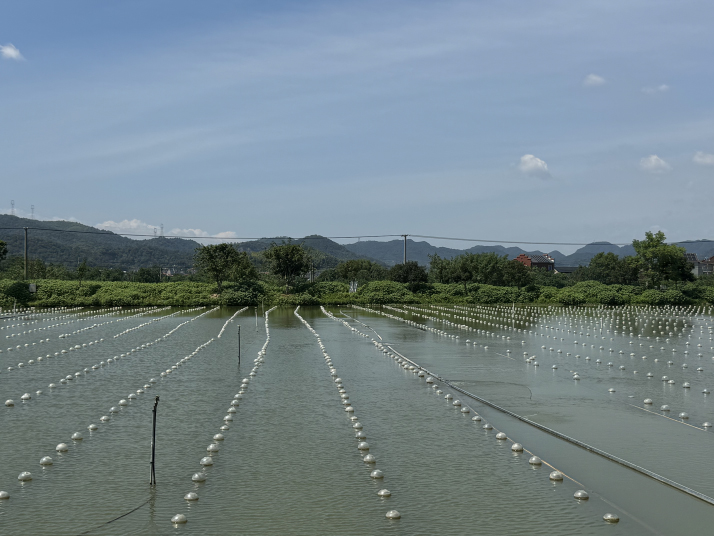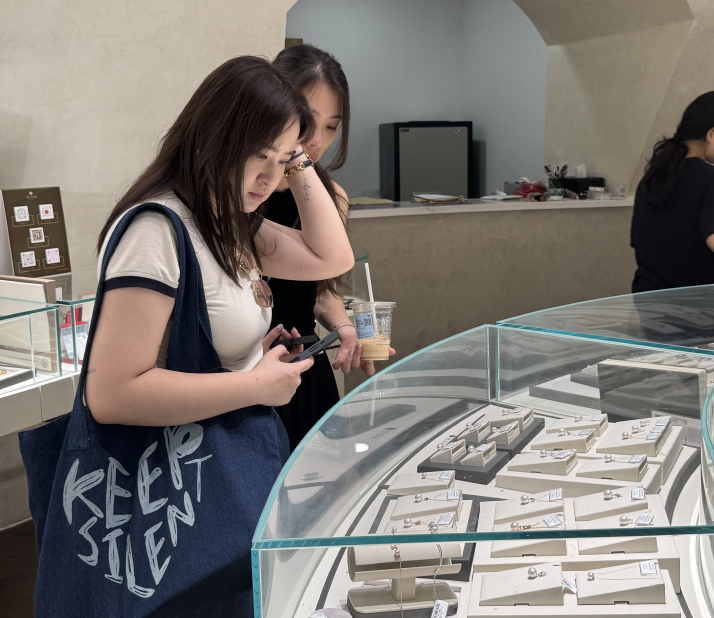| China |
| The lustrous boom of a tiny pearl town in east China | |
|
|
 A pearl farming base in Shanxiahu on August 9 (LI XIAOYANG)
For a growing number of tourists visiting the eastern Chinese province of Zhejiang, purchasing jewelry made from freshwater pearls in a local town is becoming an essential stop on the itinerary. This trend is fueled by the ascent of the freshwater pearl industry among Chinese consumers, which has become a cornerstone of local economic growth. The epicenter of this trade is Shanxiahu Town in Zhuji City, a place known as "China's hometown of pearls." Shanxiahu is home to the world's largest jewelry trading market—East China International Jewelry City—which hosts over 2,000 merchants. Local pearls have been exported to more than 70 countries and regions, including the United States, Japan and Russia. Today, Shanxiahu accounts for 80 percent of China's pearl transaction volume and 73 percent of the world's total. Average annual sales of pearl products from the town now amount to 50 billion yuan ($7 billion). Green growth Shanxiahu's freshwater pearl cultivation began in the 1970s. Local farmers used to employ farming models that caused eutrophication, a form of water pollution, leading to algal blooms and low-oxygen waters. In a push for sustainability, the local government in 2017 introduced a key regulation. It mandated that water in pearl mussel cultivation ponds and lakes must meet Class III standards within China's five-tier water quality system—Class V being the lowest tier. This class signifies water quality that is suitable for centralized drinking water sources, fishing and aquaculture. It is important to note that while Class III water is treated to be safe for drinking, it is not typically considered safe to drink directly from the source without treatment. To meet the requirement, farmers have grown selected aquatic plants in the lakes and ponds to purify the water. Local enterprises have also pursued technological innovation to explore ecological farming in recent years. Founded in 2016, Qinghu Holding Co. has moved the algae cultivation process indoors. The company uses electricity-driven temperature control and lighting systems to cultivate the algae and plankton needed to feed pearl mussels in a controlled, sustainable environment. Guo Weifeng, founder and Chair of Qinghu Holding Co., told Beijing Review that the approach, combined with the Internet of Things for precise algae feeding, avoids pollution from direct fertilizer application to water bodies and greatly increases production efficiency. The mussels are housed in a controlled aquatic environment. A network of tubes disperses a nutrient-rich solution into the water. A computer system then manages the dispersion, adjusting the amount of nutrients delivered based on factors like water temperature and seasonal growth cycles to optimize mussel health and nacre production. "The method has noticeably reduced pollution. The mussels themselves are living water filters as they take in dirty water and expel clean water," Guo said. To be specific, mussels are excellent at clearing water of cloudiness (sediment) and excess algae. With automated feeding systems, a single worker can now manage over 66 hectares of mussels, a considerable increase from the previous 3.3 hectares. Furthermore, pearl production has also jumped, from about 18,000 pearls per hectare to nearly 150,000, he said. Thanks to the combination of these practices, the water quality of pearl farming water bodies in the town has improved from Class V in the past to Class III and Class IV in some areas.  Customers select pearl accessories at a trading center for jewelry products in Shanxiahu Town, Zhuji City in Zhejiang Province, on August 9 (LI XIAOYANG)
Mussel goes market In recent years, new styles and more affordable prices compared to gold and diamond accessories have turned pearl jewelry into a new young Chinese consumer fad. Popular designs include delicate necklaces made of baby pearls, which are less than 5 mm in diameter, and silver chains featuring a single, large round pearl as a pendant. Baroque pearls with irregular shapes also perform well in the market. Nucleated freshwater pearls, which are cultured pearls created by manually inserting a small, round bead (the "nucleus") into a freshwater mussel to stimulate it to produce a perfectly round pearl, have a diameter ranging from 9 mm to 20 mm. They are rounder than non-nucleated pearls and their luster can rival that of saltwater pearls. Moreover, they can be produced at just one third of the latter's cost. Edison Pearls, a kind of nucleated pearl produced in Shanxiahu, have a quality similar to that of the world-famous saltwater pearls such as the Akoya primarily cultivated in Japan and China. Shanxiahu has been embracing live-commerce, a combination of livestreaming and e-commerce, to boost pearl sales. As of today, the town has over 7,500 livestreaming rooms which target different e-commerce platforms. Nearly 20 million packages are shipped from the town annually. "The pearl industry in Zhuji is booming with a complete industrial chain, covering live-commerce, quality examination and logistics," He Jianliang, Chairman of East China International Jewelry City, told Beijing Review. Local pearl producers are cooperating with universities and research institutes to improve pearl quality. Merchants are also turning to AI technologies to assist with the design and sales of their pearl jewelry, He added. According to local authorities, pearl producers in Shanxiahu have achieved several technical breakthroughs, including nucleus insertion for freshwater pearls along with advanced bleaching and polishing techniques. These innovations directly address the long-standing challenges of small pearl size, low rates of perfectly round pearls and limited color variety. Furthermore, the introduction of automated pearl selection systems in local companies has achieved a sorting accuracy of 99.8 percent, increasing operational efficiency eightfold compared to traditional manual methods. To expand their global presence, pearl businesses in Shanxiahu have built shared overseas warehouses. Many local enterprises are riding the tide to reach consumers worldwide. Based in Zhuji, Shilixian Jewelry Co. Ltd. first launched cross-border online sales of its pearls in 2021. The company has recruited a group of international livestreaming hosts, with its business covering regions including Europe, the U.S. and East Asia. To cater to consumer preferences across different countries and regions, Shilixian has launched tailored innovative products. It provides small pearls with delicate designs and subtle luster for Japanese consumers, while introducing baroque pearls, grown in an irregular, non-spherical shape, for those in Europe and the U.S. who prefer more unconventional designs. Sales figures during a single company livestreaming session can amount to $30,000. The town has established a cross-border e-commerce base, providing streamlined services for pearl enterprises and introducing global e-commerce platforms such as Amazon, TikTok, AliExpress and WISH to expand international sales channels for local firms. In 2024, the cross-border sales of pearls from Shanxiahu exceeded 500 million yuan ($70 million). Shanxiahu's pearl industry has attracted visitors to try their hand at opening mussels, as well as customizing pearl jewelry. Last year, the number of tourists visiting the town exceeded 600,000. BR (Print Edition Title: What a Gem!) (Reporting from Zhejiang Province) Copyedited by Elsbeth van Paridon Comments to lixiaoyang@cicgamericas.com |
|
||||||||||||||||||||||||||||
|